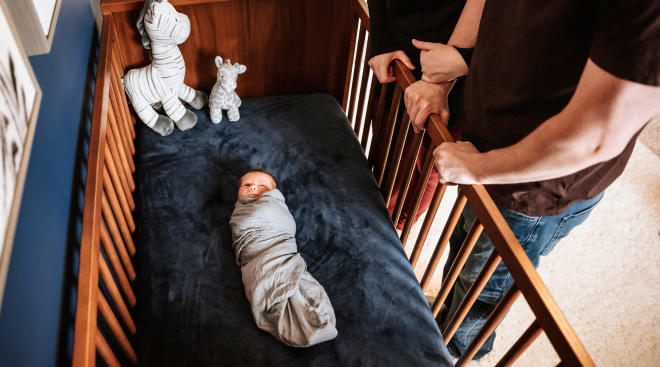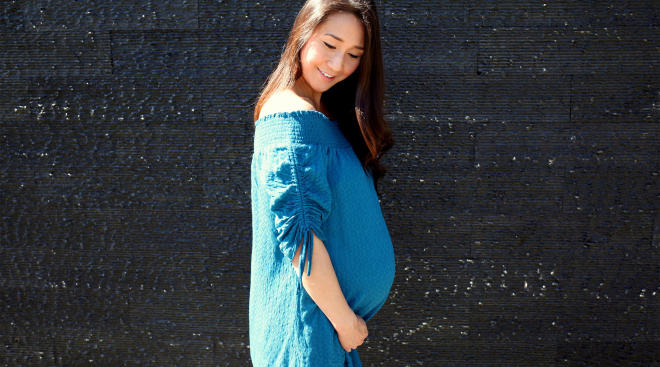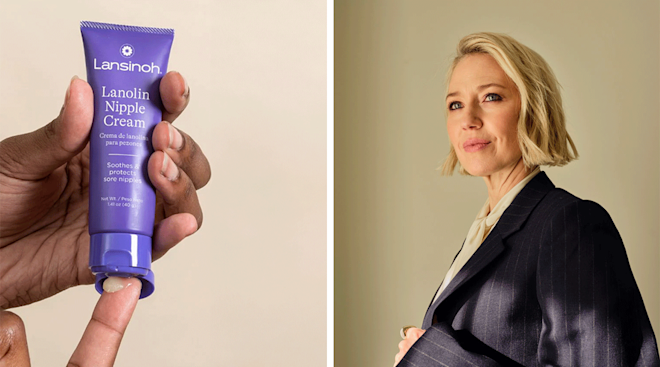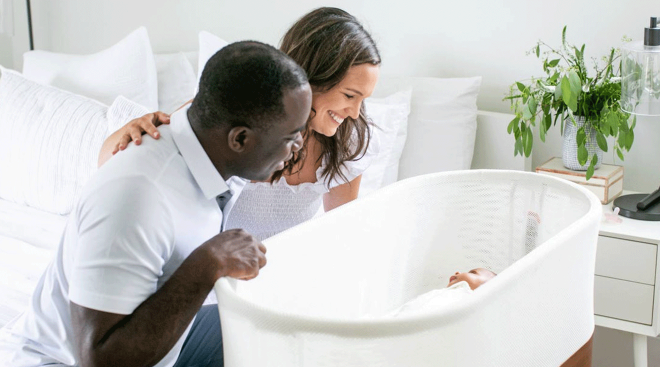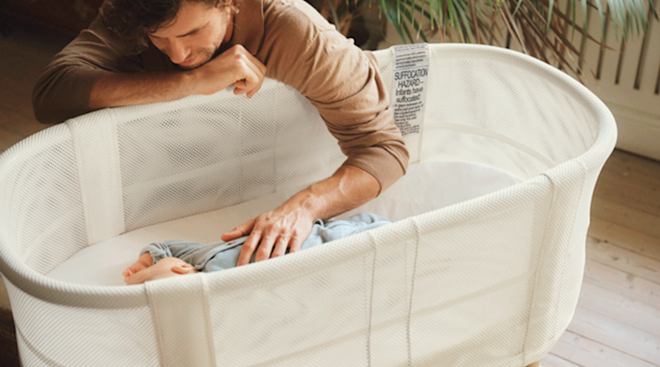How to Prepare for the Invisible Business of Being a Mom
I almost divorced my husband over a pizza box. Our daughter was 6 weeks old and I was trudging through early motherhood sleep deprived, largely un-showered and completely disconnected from my own sense of self. She cried nonstop for her first two months of life, which I later realized was due to a lactose intolerance that should have been so obvious but at the time I couldn’t see. During one particularly challenging evening, I opened our refrigerator door and saw that evening’s dinner shoved haphazardly onto the second shelf: a large pizza box with approximately two slices remaining.
My skin prickled with anger over the near-empty box that my husband had crammed into our fridge, threatening to send jam jars and breastmilk bottles toppling over. What was so hard about removing the last two slices and placing them on a plate or wrapping them in foil, and tossing the box in the recycling bin? (Answer: Literally nothing.) The only explanation for such absentminded behavior was that he expected me to do it, like he expected me to do everything else—and that was the rub. Not only was I responsible for bringing our child into the world, caring for her, trying to recover from my own surgery, while also planning for, researching and executing 99 percent of all the invisible business of having a child, I was also apparently charged with teaching my husband how to be an adult. That was when I gave myself the pep talk that most women have with themselves at some point during early motherhood.
“Ok, Leslie. You can do this. There are plenty of single mothers in the world, and you are capable of doing this on your own. It’s not going to be easy, but you have family and friends to lean on. Plus, it’s not like he’s doing all that much anyway. You got this.”
Call me naïve, but I had always imagined that parenting would be this 50/50 thing. Pregnancy and delivery would, of course, rest on my shoulders, but beyond that, I thought the rest would be a fairly even split. I had always planned on returning to work, and between the two of us, my husband was the one eager to start the family chapter of our marriage. He was loving, doting and I knew would be a very attentive father, but early into my pregnancy, I started to notice the pile of baby books on his nightstand begin to collect dust.
I chalked it up to a daddy disconnect; I knew that many men have a hard time conceptualizing a baby before birth. Or as my best friend’s husband so aptly put it, “Sometimes I just forget you’re pregnant!” At the time, it didn’t bother me. I rather enjoyed the prep and planning for baby, and because he wasn’t as actively involved, I was able to make most decisions without any pushback.
By the time our daughter arrived, I had done the mandatory reading and taken enough classes that I felt relatively knowledgeable about the logistics of having a small human. To be fair, it still wasn’t very much, but it was better than nothing—which was a lesson my husband would soon learn. Through the early weeks and months of postpartum life, I realized that our partnership was beginning to feel like a one-woman show, for an audience of no one.
The physical care of our daughter was a fulltime job, and my husband was as present with her as his career would allow him to be, but that wasn’t my real gripe. Often the most tedious part of parenthood is the invisible business of having a newborn—the behind-the-scenes minutiae that occupy our days: sterilizing cool mist humidifiers; researching homeopathic diaper rash solutions; pumping, pumping and pumping some more; figuring out when to transfer from an infant to convertible car seat; agonizing over when to introduce peanut butter; testing new baby body washes; scrubbing breast milk stains out of the couch and spending a horrifying amount of time reading Amazon reviews of baby monitors.
Fortunately, women today are beginning to have meaningful conversations about unseen labor (thanks in large part to writers like Eve Rodsky and Brene Brown), but early motherhood is a very particular window of time and therefore we must approach it a bit differently. In my own book, I discuss at length the busy work of having a newborn, and how so much of it becomes our own encumbrance purely because of the nature of motherhood.
Early parenthood places many of our partnerships on a trajectory that can be difficult to redirect later. By the time your baby is born, not only have you been carrying the entire physical load of baby, but also much of the business as well. And because you did the reading and the planning, you become the de facto A-team for all the baby’s needs. In many relationships, it just becomes assumed that you plan doctor’s appointments, reorder diapers, sterilize the bottles, pack and unpack the diaper bag, sort through outgrown clothes and so on. You can change a diaper in 30 seconds, while it would take your partner five minutes, so why not just do it? How many of you have ever said, “it’s just easier if I do it myself”?
When I tried to explain to my husband the weight of this invisible load and how unappreciated I felt in all of it, it was like trying to explain quantum physics to an ant. For the record, my husband has an ivy league degree (humble brag), but he couldn’t understand that which he couldn’t see. He never considered reordering a faster flow nipple for our daughter’s baby bottles or researching eco-friendly laundry detergent, because those concepts didn’t even exist in his world. And that is the problem. Ladies, if we don’t break a few plates now and then, we’re always going to be tasked with unloading the dishwasher.
Asking our partners to recognize and acknowledge the incredible burden we place upon our shoulders is only the first step. After that, we need to create a plan that actually offers solutions and a shared labor. I don’t care if your partner works and you’re at home—your sanity is paramount. Nothing about their job should prevent them from doing a midnight diaper change. If you can manage to keep a child living and breathing while on practically zero sleep, they can manage to add an extra shot of espresso to their mobile app order. What you need in your house may be different than what the next family might need, but the important thing is that new moms aren’t carrying it alone.
For expectant families, I would suggest having these conversations well before the baby arrives and establish expectations. You might be the only one pregnant, but you’re not the only one having a baby. This might be as simple as creating a list or chart for who is going to be responsible for what–and sticking to it! If your partner is in charge of ordering diapers, that means if you run out in the middle of a Tuesday afternoon, it’s on them to figure it out.
Beyond the busy work of having a baby, new moms also really need the physical presence of our partners, but for many families, it’s not always possible. As I type, only nine states offer paid family leave, which is such a disservice to all young families and to the economy (according to Alexi Ohanian, the Reddit founder who is now taking on Washington D.C. to help spur the movement for paid family leave, nearly $500 billion in value is lost when women aren’t able to get back into the workforce because of a lack of support at home). Archaic ideas of what the family dynamic should look like are so deeply rooted, and it can feel like an uphill battle, but we aren’t the same women that we were 75 years ago, and our modern family structures need to start reflecting that. Regardless of whether you choose to be a stay-at-home mom, a working mom or somewhere in between, we all deserve more support.
Not to mention, the perks of parenthood are a lot more rewarding when you’ve actually done the work to nurture that little seed and watch as your child grows. Studies have shown that establishing a healthy and meaningful partner-child relationship in the early days after birth is incredibly beneficial for both people. Not to mention the endless benefits it has for a child to see two parents working together, in harmony, to make a family run. And maybe, just maybe, by the time our children become parents, they won’t be forced to go out and recreate the wheel, because we’ve already shown them the example of what a more balanced home should look and feel like—which should never, ever include a giant empty pizza box shoved into a fridge.
Meaningful change takes time. Shifting generations of pre-established norms isn’t going to happen overnight, but don’t you think it’s about time we start?
Leslie Bruce is an award-winning journalist, a New York Times *bestselling co-author and the founder of Unpacified, an online community for mothers. Her debut parenting book, You Are a F_cKing Awesome Mom_, was released in September 2019. She lives in Laguna Beach, California, with her husband and two children.
Published November 2019
Navigate forward to interact with the calendar and select a date. Press the question mark key to get the keyboard shortcuts for changing dates.









































